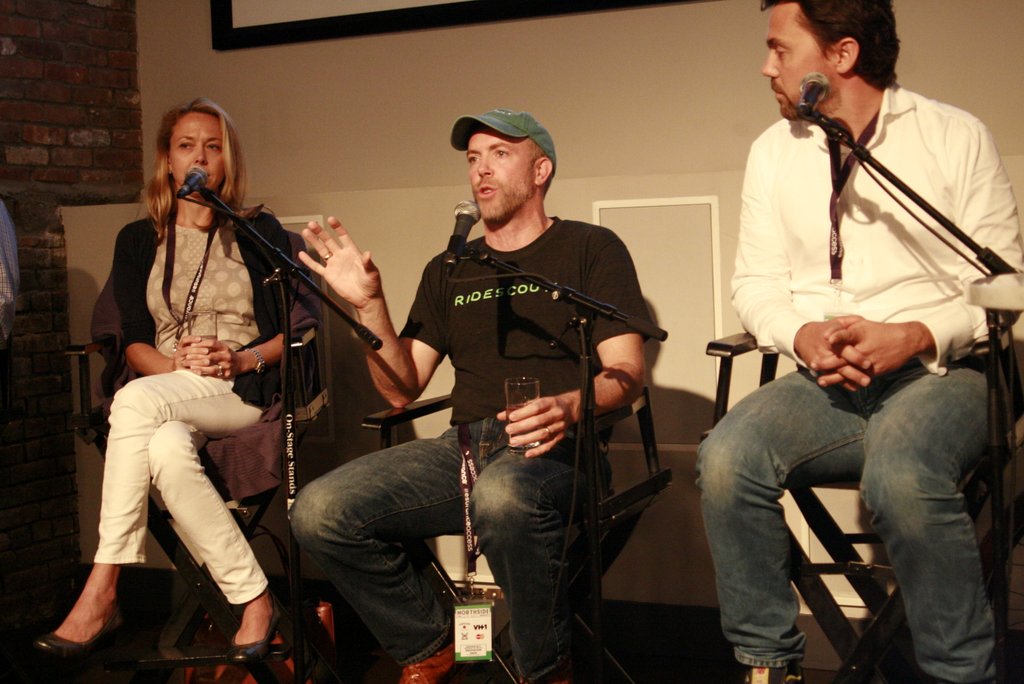Taxi drivers are doomed.
That was one of the big takeaways from a Northside Innovation Festival session on “Disrupting Transportation” led by Transportation Nation’s Alex Goldmark (who is also a contributor to WNYC’s tech podcast, New Tech City).
Technical.ly Baltimore has extensively covered the controversy surrounding ridesharing services like Uber and Lyft, including tensions between app-based services and the traditional taxi companies they compete with.
However, as Joseph Kopser, cofounder and CEO of RideScout, pointed out, the political fight between the new ridesharing economy and the old ride-hailing economy only matters to the medium-term profits of a few current players.
In the long term, Kopser argued, ridesharing, combined with the rise of the driverless car, will be a one-two punch that professional drivers won’t be able to sidestep.
That the driverless car was coming was a point the transportation entrepreneurs on the panel seemed to have reached consensus on.
None of them wanted to hazard a guess as to how soon the cars would be street legal, but no one questioned that they would soon be commonplace. We bet they’ll appear first at large, controlled spaces like corporate campuses, vacation resorts and industrial parks, then fan out from there.
The panel included Taco Carlier of the Dutch, electrically-assisted bike maker VANMOOF, Gretchen Effgren of Zipcar, Michael Mikos of Car2Go and RideScout’s Kopser.
Here are some other takeaways from the conversation, which took place at the Wythe Hotel on Friday:
- More data, more options. Bridj is a pop-up bus service, crowdsourcing bus routes in Boston based on where its user are and where they say they need to go. Right now, RideScout is a way of showing all your options for a route, from public transit to various forms of sharing, but soon their machine learning will be at a level to show you the best route for you, diminishing the frustration of getting overwhelmed by options.
- Huge market. Kopser said he’d like to see a reimagining of ownership, where riders use as much of a transportation resource as they need and then put it back into the economy. (That is, instead of parking a car which does no one any good for most of the day, putting it to work.) Goldmark pointed out that Zipcar and Car2Go seemed to be getting along quite well on the panel, despite being competitors. Kopser said that’s easy to explain: as well as both services have done, they have barely touched the potential market of 280 million car drivers in America alone. Their competition isn’t each other, but car ownership.
- New trends afoot. Effgren said that people’s preferences are really changing. “The city [of Boston] demonstrated that from 2008 to 2012, at a time when the city was growing 4 percent a per year, it showed a 50K reduction in car registrations,” he said. Some 40,000 new Zipcar members signed up in that same time period. Car-sharing also has demonstrable reductions in pollution, as people who make the switch make fewer overall trips by car, since they no longer have one.
- Parking. At the end of the panel, Effgren told the audience to watch for some real innovations in parking coming soon. Streets will become much less clogged if people can get to the nearest available parking spot faster. Technical.ly recently covered one such effort in Baltimore.
- Easier bikes. Two serious problems plague greater bike adoption, according to Carlier: sweat and theft. VANMOOF is working to take some of the sweat off by giving riders a small electrical motor to assist them when biking gets tough. Carlier also wants to make it more likely that police will help retrieve stolen bikes if built-in technology will show them exactly where they are. Carlier promised that if any Americans have a $3,000 VANMOOF bike stolen he will personally make sure it gets retrieved. He told a story of a Florida man whose bike has been taken and retrieved by police twice now.
- Bonus mind-bender. Goldmark raised a philosophical question for everyone at the event by asking whether or not we are better off in a world where smartphones tell us that we are constantly the blue dot at the center of the whole map. “I’m not super happy with being the blue dot at the center of the universe,” Goldmark said.
Join the conversation!
Find news, events, jobs and people who share your interests on Technical.ly's open community Slack
